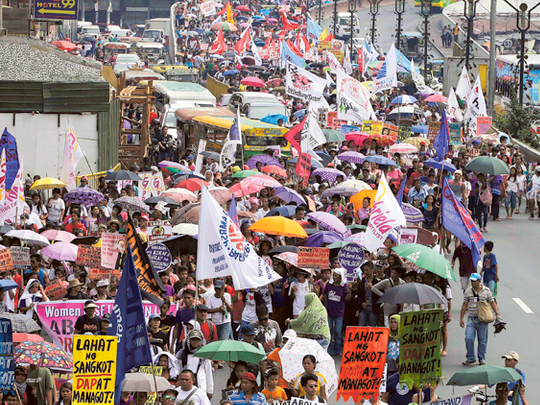
MANILA: Thousands called for the gathering of 10 million signatures to kickoff the creation of a “People’s Congress” that will pass a law criminalising the reinstitution of a pork barrel system in the national budget, during a protest rally at Manila’s central Luneta Park on Monday.
“This is a genuine people empowerment,” said Angela Cuadra, a participant who manned one of the more than 20 tents that were pitched at the Luneta Park, representing Metro Manila’s cities and municipalities, and nearby provinces, where protesters signed up for the creation of Peoples’ Congress to stop the pork barrel system in the national budget.
Some 20,000 participated in the rally, organisers said, but police claimed only 5,000 protesters came.
“The Abolish Pork Movement, a coalition of church-based, professional, sectoral groups and militant lawmakers, called for the gathering of 10 million signatures by end of December to create a People’s Congress that will pass a law to criminalise all forms of pork barrel system in the national budget. This way, the president and lawmakers would no longer be allowed to use discretionary funds to perpetuate a long tradition of patronage politics and political dynasties in the Philippines,” said Congressman Neri Colmenares of Nation First, a militant sectoral party at the House of Representatives.
“We want a total abolition, in any form, of the Priority Development Assistance Fund (PDAF) allocated to lawmakers in the two houses of Congress,” said Colmenares, referring to the P200 million (Dh166.6 million) and P70 million (Dh58.3 million) allocated to each of the 24 senators and more than 200 congressmen every year.
Lawmakers allegedly approved the release of their PDAF to ghost projects and fake implementers, to enrich themselves, a scandal which angered Filipinos in 2013.
“We also want to scrap any form resurrecting the Disbursement Accelerated Program (DAP) that was created by President Benigno Aquino in 2011, which was funded by savings of line government agencies,” said Colmenares, adding, “When the president disbursed his pork barrel to senators and congressman, it was explained away as a form of stimulating the economy, and not for political accommodation.”
“We want to implement the ruling of the Supreme Court that called PDAF and DAP unconstitutional. Our proposed law will criminalise anyone who is trying to revive PDAF and DAP in the national budget,” explained Colmenares.
“Only a Peoples’ Congress could do this. The president and members of the two houses of Congress whose DAP and PDAF were called unconstitutional and presumed their guilt, are not expected to push this kind of law,” he argued.
Last year, when the Supreme Court declared PDAF (of Congress) as unconstitutional, the Aquino administration continued to strike deals by allocating funds for the lawmakers’ development projects in the 2014 budget, ahead of the 2016 elections, said Colmenares, adding that several lawmakers, including Congressman Antonio Tinio of a sectoral party of teachers at the lower house of Congress, have attested to the “quiet morphing of PDAF”.
“This could also mean secret morphing of President Aquino’s DAP to fund lawmakers’ projects for political accommodation. Patronage politics in the Philippines continues. Nothing has changed,” observed Rosario Agno, a student protester.
The 1987 Constitution allows for a people’s initiative if Congress refuses to pass a bill that is being sought by everyone. “The president cannot veto a law passed by Peoples’ Congress,” explained Colmenares.
For the campaign to succeed, organisers must gather 10 per cent of registered voters nationwide; and districts must be represented by three per cent of their registered voters. There are 52 million voters registered in 2010, and an estimated 52.2 million in the 2016 polls.
“We have started to put up signature stations in churches, markets, schools, and town plazas with the help of our coordinating committees nationwide,” said Colmenares, adding that 10 million signatures is almost double the required minimum signatures for the creation of a People’s Congress.
“After Monday, we will reach out to other parts of northern Luzon,” vowed an organiser. Another campaign will be held in Cagayan de Oro or Davao in Mindanao, southern Philippines. The campaign began in Cebu, central Philippines last Saturday.
Identifying additional issues the coalition will uphold, spokesman Monet Silvestre said, “On the side, we are campaigning against the allies of President Aquino who want to scrap the Judiciary Development Fund (JDF). It is in retaliation for the Supreme Court’s ruling against the president’s DAP last July 1.”
“We are also against the campaign to amend the Constitution to lift the six-year term limit of the president,” said Silvestre, adding, “We want everyone who has been implicated in the pork barrel scandal to be investigated. It is outrageous that only opposition lawmakers were investigated and imprisoned for alleged misuse of development funds.”
A people’s campaign against corruption began in 2013. Aquino, who campaigned against corruption when he ran for office in 2010, was not yet the target of people’s ire at the time.











